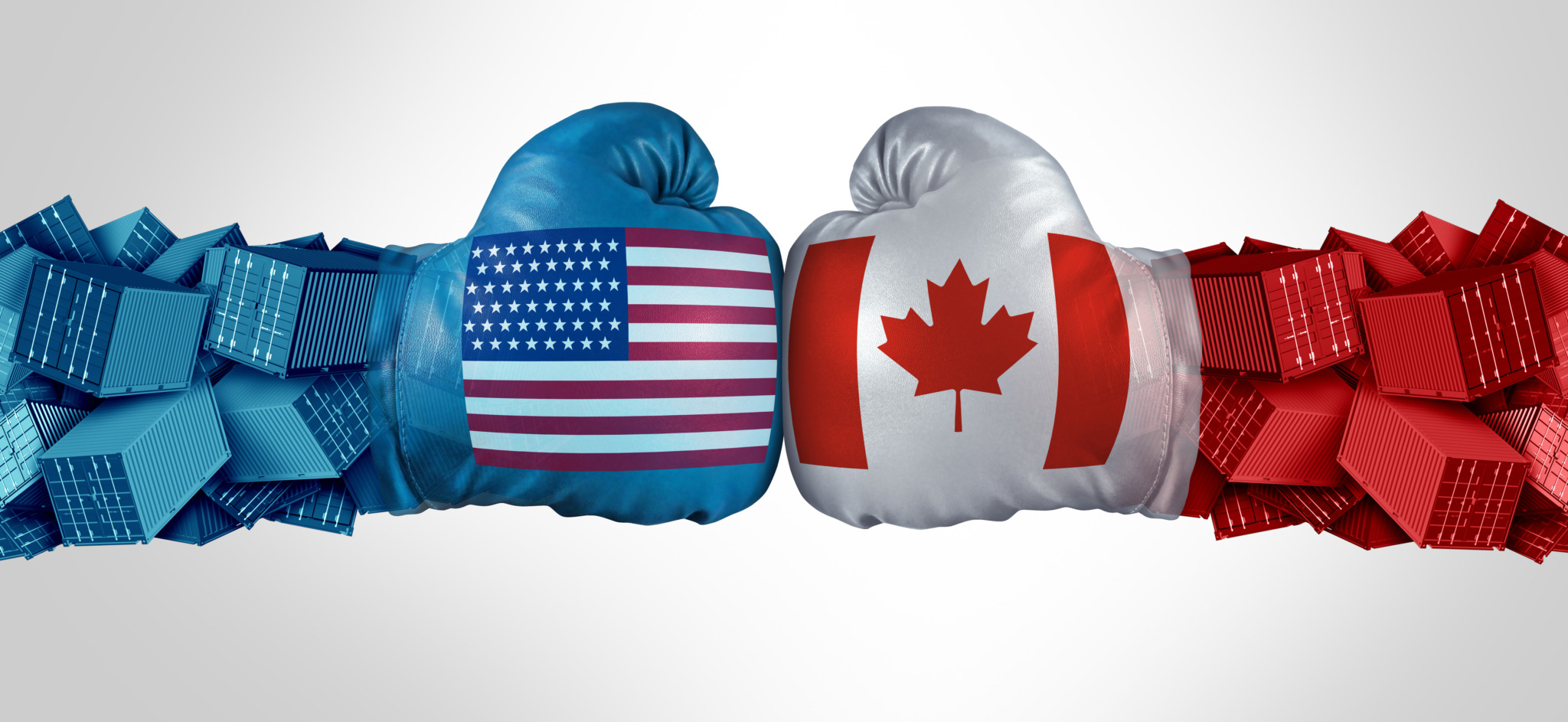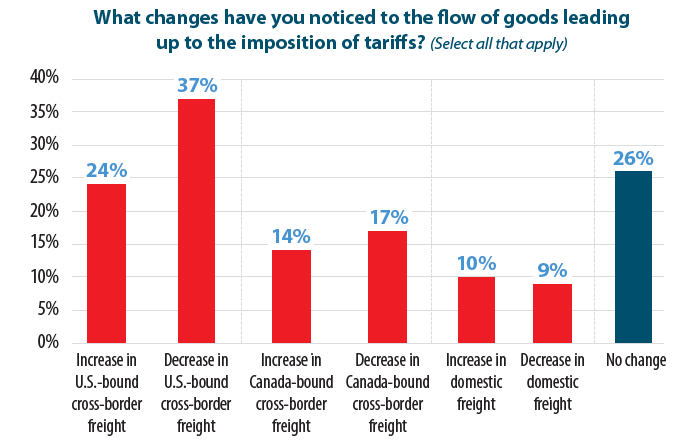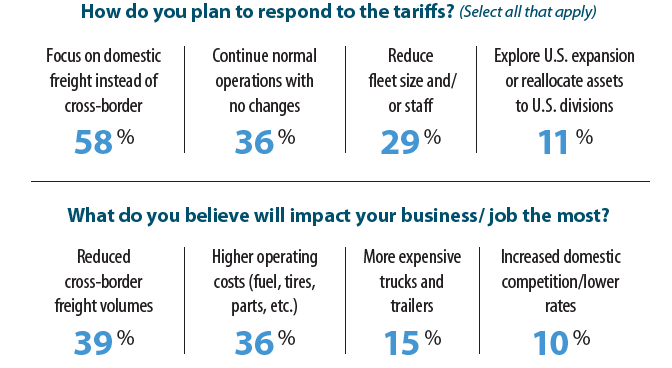U.S. President Donald Trump’s latest move to impose a 25% tariff on all automobile imports next week is sparking renewed concern in the Canadian trucking industry, in which businesses already report job losses, route changes, and rising costs linked to the growing trade tensions.
This is according to our latest Pulse Reader Survey, that will be published in the April issue of Today’s Trucking. The responses were collected in early March, prior to Mark Carney becoming the new leader of the Liberal Party and Prime Minister of Canada.
Out of more than 230 respondents, 58% said they are shifting focus toward domestic freight, while 39% have already seen reduced cross-border freight volumes. The imposition of earlier tariffs on Canadian goods — and Ottawa’s retaliatory measures — led many to brace for disruption, with respondents citing fears of inflation, shrinking freight volumes, and longer-term shifts in North American supply chains.

Thirty-six per cent said they’re expecting to see higher operating costs, including for fuel, tires and parts, and another 15% anticipate more expensive truck and trailer purchases due to disrupted supply chains. About 29% said they will respond to tariffs by reducing fleet size or staffing levels. Thirteen per cent of companies have already laid off drivers or staff.
Given the scope of the uncertainty this trade war brings to the industry, we asked our readers to elaborate and share their personal concerns and fears in us in their own words.
One respondent said their 30-year cross-border relationship is already over: “I have been hauling organic grain to the same WA-state company for over 30 years. With the 25% tariff, they are looking to buy from within the U.S. and Argentina. Last load delivered March 4. Unless things change, I have lost my job.”
Others reported similar fears. Another reader said, “If these tariffs continue I will probably lose my job in three months!”
People call for policy changes, stronger leadership
When asked how the government should respond to the tariff threat, 34% of survey respondents want the federal government to reduce internal trade barriers, while 32% support retaliatory in-kind tariffs. Another 28% pointed to the need to crack down on illegal Canadian trucking operations. Just 6% suggested tightening border security.
Several responses shared the common sentiment to remove interprovincial trade barriers, invest in domestic manufacturing, and expand infrastructure to export through non-U.S. ports.

“Our confederation needs to come closer together. Only through that and seeking other international economies of interest will we get through this,” one of the readers wrote. “This means making sure products can leave our ports — and it also means we need to expand our ports, in B.C. for example, [and] leveraging other ports of entry like Prince Rupert and looking for similar opportunities in the east. The time is now to leverage our international connections and make free trade elsewhere. This goes for no matter which party is in power.”
With cross-border operations in flux, some carriers are reconsidering their footprint entirely. Eleven per cent of respondents said they are exploring expansion or asset reallocation to U.S. divisions. Others expect increased domestic competition and rate pressure, with 10% citing “lower rates” as an anticipated effect.
“The better-performing trucking companies will rise to the top and many of the ‘fly-by-night’ and shadier companies that emerged post-Covid will finally disappear,” one of the readers believes. They add that fleets should remain vigilant and not plan any expansions until the trade war is over.
Mixed reviews for federal response
When asked for feedback on how the federal government has been handling the situation, the responses ranged from praise to sharp criticism.
Some applauded the government, with one reader saying, “They are standing tall and doing what needs to be done!” Another said, “I can’t believe I’m saying this, but this is the first time I thought Gov. Trudeau has some balls.”
Others, however, think differently. “We need stronger leadership in Canada to negotiate and stop fighting amongst ourselves,” one said, while condemning retaliation. “Unfortunately, the past 10 years we have become far too reliant on the U.S. as a partner.”

Others criticize retaliatory tariffs as well, out of concern that it will hurt Canadians. “Matching tariffs will only hurt Canadians who are already struggling with inflation,” one wrote. “Cut the supplies of items that are critical to the U.S. Show them we mean business. Trump is a bully and we need to stop dancing like a puppet on a string for him.”
Another respondent argued: “Retaliation with more tariffs is a bad move. Negotiate and try to work through this with the U.S. government. Understand what they are trying to accomplish and see what synergies you can find.”
One reader called Canada’s response to the U.S. tariffs “too reactive”, while saying that without immediate action – including tax relief, diversifying trade and strengthening domestic markets – rate compression and industry consolidation will make many small carriers go under.
Reducing internal trade barriers
And there were others that focused on domestic policies. A few called for the elimination of the carbon tax and GST on fuel and repair parts to help offset increased operating costs. “The Canadian government needs to reduce GST on fuel, auto parts and auto repairs…delete the carbon tax to assist carriers,” wrote one respondent. “That would increase cash flow and protect job stability.”
Since then, newly-appointed Prime Minister Carney did cancel the carbon tax as his first act after being sworn in.
Nearly a third of the respondents also called for more enforcement, asking for a crackdown on illegal trucking operations, particularly misclassified drivers operating as independent contractors, known in the industry as Driver Inc. One respondent believes this should be a priority not just for fairness but for trade security.
“I am surprised it made it to your list of government responses to tariffs! I do not understand why so few people don’t see this. Everything that crosses the border, crosses in a truck,” they wrote. “Spend the money on auditors and enforcement of CRA rules on driver misclassification. This will put the illegal operations out of business and leave just good, honest hardworking people taking legal freight across the border.”
With Trump’s latest executive order set to take effect next week, fleets across Canada are bracing for what comes next, but as one reader put it: “This trade war is going to have only losers. But we have to retaliate, otherwise Canada is the biggest loser. Canada should focus more on domestic trade [and] remove interprovincial trade barriers.”